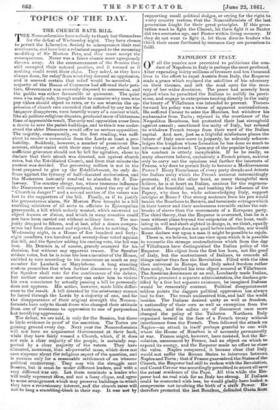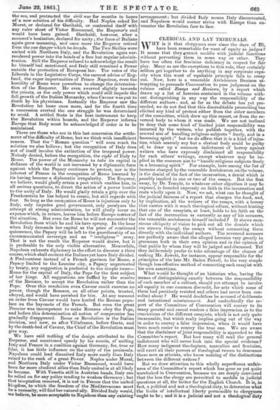NAPOLEON' IN ITALY: O F all the puzzles now presented to
politicians the cons duct of Napoleon-in Italy is perhaps the:most profound. After expending thirty million& oftreasure and ten. thousand. Jives in the effort to expel Austria from. Italy, the Emperor made a peace which.replaced the satellites of his- adversary on their thrones, and• left the: roach open: for. the recta, very of her wider dominion. The peace had scarcely been signed when he permitted' the Italians to nullify ita, provi- sions, and engage in enterprisestending directly to .the unity the treaty of Villafranca was intended to prevent. Thence- forward. his policy was a.tiissue of apparent contradictions. He suffered Cavour to- seize the: Marches, but withdrew his• ambassador from Turin; rejoiced in the overthrow of the Neapolitan Bourbona, but, protected their last stronghold against assault ; [sanctioned the unity of Italy, but refused to withdraw French troops from their ward of the Italian capital. And, now,, just as- & frightful_ misfortune places, the future of Italy once more in jeopardy, he: solemnly acknow- ledges the kingdom whose formation he has done so much to advauce—nadtnretard. Upoaany of the popular hypotheses, his conduct is utterly inexplicable. If he be really; as many observers. believe, exclusively a French prince,, anxious only nil carry out the opinions, and further the interests: of. France; whydoea he permit Italy to become-a Mediterranean Power. 7 Every Frenchman of every party dreads and detests the Italian unity which the French autocrat in.termittingjy protects. If, on the other' hand, as' many thoughtful men believe, he is at heart an. Italian, anxious for the regeneras tion of the-beautiful land, and loathing the influence of the Papacy, why does he, while acknowledging- Italy, support intrigue at Rome ? One strong sentence from his pen would banish the Bourbons to-Bavaria, and terminate outrages which in their horror and their uselessness resemble rather the out- breaks of slaves than the movements of a European party. The third theory,.that the Emperor is overrated, that he: is. a man without plans' beyond the exigencies, of the: hour; vacil- lating in will and short-sighted in design; is, we think, equally • untenable. Europe does not quail before imbeciles, nor 'would Rome declare war upona man it might be possible to cajole. There is, we:believe; but onaview upon: which it is possible to reconcile the strange contradictions which from the dny of Villafranca have distinguished- the Italian policy of the. Emperor._ His. abject from the first has been,. not the good of Italy, but the: contentment of Italians, to concede. all things, rather than:face the- Revolution. Filled: with the ideas them universal in. Europe, that Italy asked freedom rather than unity, he fancied his true object secured at Villafranca. TheAuetriao dominance. at an end, Lombardy made Italian,. Venetia promised a separate administration, the duchies gra.- tifi.ed by a free but separate existence, he imagined Italians would be reasonably, content. Political disappointment eldom points the daggers political ,oppression has. always lad to fear. The result u.ndoceiv,ed, him, and half the world besides. The Italians desired unity as well as freedom; a nationality of their: own as well as exemption from the Austrians,, and the sullen cry- of discontent once more changed the, policy of the Tuileries. Northern. Italy organized herself in the face of a. French treaty without. interference from the- French. Then- followed the attack on: Naples—an attack in itself perhaps grateful to one with whom the House of Bourbon is of necessity permanently at war: France might, however,, have resisted, but the Re- volution, unmenaced by France, had an object on which to, expend its energy, and the Emperor made no effort to close, the valve. Naples conquered; it became clear that Italy would not suffer the Roman States to. intervene between. Naples-and Turin ; that if France: guaranteed the States of the Church; the Einperor had still to reckon with the Revolution, and Count Cavour was accordingly permitted to annex all save• the actual residence of the Pope. All this while the Em- peror had no real wish for an. Italy too strong. If Italians could be: contented with less, he would gladly have hailed al compromise not involving the birth of a sixth Power. He therefore protected the last. Bourbon„ defended. Gaeta. from the sea, and protracted the civil war for months in hopes of a new solution of his difficulty. Had. Naples asked' for Murat, or declared for Garibaldi, or contented itself' with any ruler short of Victor Emmanuel, the Emperor's end would have been gained. Garibaldi, however; after a moment's hesitation, declared for unity ; the faces of Italians again grew menacing, and once more the Emperor retired from the one danger which he dreads. The Two Sicilies were united with Northern. Italy, and the Revolution again sur- rendered power into the hands of a free but regular adminis- tration. Still the Emperor refused to acknowledge the result he himself had sanctioned, and Italy still remained a Power outside the protection of European law. The votes of the Liberals in the Legislative Corps, the earnest advice of Eng- land, the eager importunities of Prince Napoleon, even the hostility of Rome were powerless to change the determina- tion. of the Emperor. He even swerved slightly towards the priests, as the only power which could still impede the full growth of the Italian Monarchy, when Cavour was pnt to death by his physicians. Instantly the Emperor saw the Revolution let loose once more, and for the fourth time a concession averted the one struggle he was determined to avoid. A settled State is the best instrument to keep the• Revolution within bounds, and the Emperor informs Europe that Italy must be acknowledged if order is to be maintained.
There are those who see in this last concession the settle- ment of the difficulty of Rome-, but we think with insufficient reason. That the "Roman question" will soon reach its -solution we also believe ; but the recognition of Italy does not of itself involve the extinction of the temporal power. Nobody denied, before the recognition, the right of Italy to Rome. The power• of the Monarchy to take its capital in defiance of the world is not increased by a diplomatic form against which the Papacy continues to protest, nor is the interest of France in the occupation of Rome• lessened by its having become a. diplomatic irregularity. The Emperor, we believe, would gladly retain a post which enables him, in all serious questions, to direct the action of a power hostile to the unity of Italy. He would gladly retain a grip over the Frankenstein he has helped to create, but still regards with fear. So long as the occupation of Rome is injurious only to Italy, only impedes good government, only paralyzes the attempt at strong administration, he will gladly incur an expense which, in return, leaves him before Europe =ester of the situation. But even for Rome he will not encounter the Revolution from which he and his have sprung. In the hour when Italy demands her capital as the price of continued -quiescence, the Papacy will be left to the guardianship of an excommunicated sovereign and an " irreligious " army. That is not the result the Emperor would desire, but it is preferable to the only visible alternative. Meanwhile, Napoleon exhausts diplomacy in the effort to discover a third course, which shall content the Italians yet leave Italy divided. A Piedmontese instead of a French garrison for Rome, a Papacy limited to the Leonine city, a Papacy unprotected by treaty, any suggestion is preferred to the simple issue— Rome for the capital of Italy, the Pope for the first subject of her kings. All suggestions are baffled by the resolve of the Romans, to accept the Revolution rather than the Pope. Over this resolution even Cavour could exercise no power, though the Romans, on all other points, trusted, obeyed, and would have perished for him. At any moment an order from Cavour would have hurled the Roman popu- lace on the bayonets of the- French. But even the great Premier was incompetent to make Romans obey the Pope, and before this determination all notion of compromise has gradually disappeared. Rome or Revolution is the Italian decision, and now, as after Villafranca, before Gaeta, and by the death-bed of Cavour, the Chief of the Revolution must give way. We have said nothine° of the design attributed to the Emperor, and mentioned openly by his cousin, of uniting Italy and France in a coalition against Germany, for, true or false, it has little influence on the unity of the peninsula. Napoleon could lead disunited Italy more easily than Italy raised to the rank of a great Power. Naples under Murat, and Northern Italy under Victor Emmanuel, would have been far more obedient allies than Italy united is at all likely to become. With Venetia still in Austrian hands, Italy can be relied on for any policy tending to weaken Germany ; but that temptation removed, it is not in France that the united kingdom, to which the freedom of the Mediterranean must be a necessity, will find her natural ally. Divided Italy would, we believe, be more acceptable to Napoleon than any existing arrangement ; but divided' Italy means Italy discontented, and Napoleon would sooner strive with Europe than en- counter the Revolution face to face.































 Previous page
Previous page